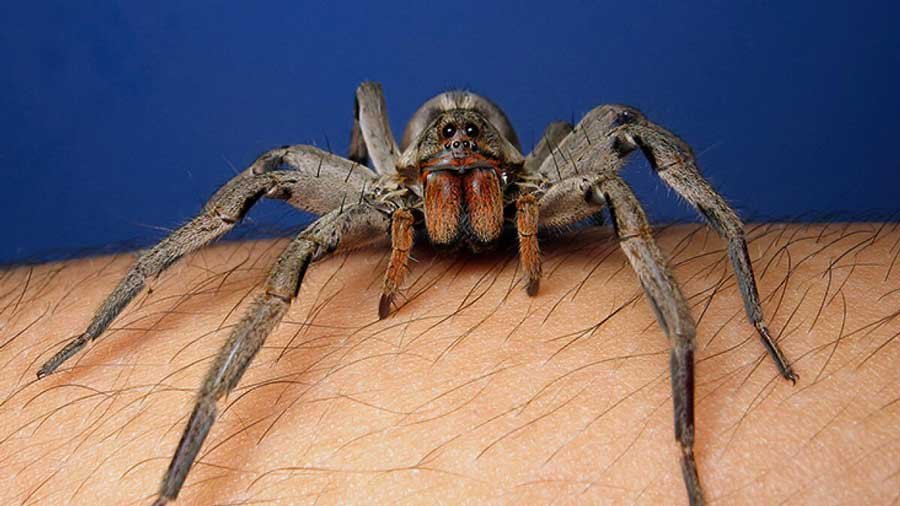Wolf spiders are some of the most prominent and most notorious spiders in North America. They belong to the family Lycosidae, which contains approximately 200 different species. These spiders are found in nearly every region of the world and are particularly common in the United States.
Expert gardeners usually consider wolf spiders beneficial because they eat insects, including roaches. However, sometimes they bite people, and their bites can be quite painful. So, what should you do if you’re unlucky enough to get bitten by a wolf spider? Keep reading to find out!
When Does a Wolf Spider Bite?
Wolf spiders get their name from their hunting style. They don’t build webs to trap prey but actively stalk and chase down their meals. Wolf spiders are very fast and agile. They’re usually large, hairy creatures that have a color pattern of black, gray, or brown shades mixtures with pale stripes marking on their back.
Like most spiders, they have long torsos and eight eyes, but wolf spiders’ eyes are arranged in three rows. This makes them particularly good at seeing prey from different angles and allows them to see in low-light conditions. They live on the ground and often hide under rocks or in burrows during the day. Then, at night, they come out to hunt.
Wolf spiders are generally shy and not aggressive but will bite if they feel threatened. For example, if you accidentally step on a wolf spider or corner one, it may bite in self-defense. In most cases, wolf spider bites are not serious and only cause minor pain and swelling. This is because their venom has low neurotoxic action. However, some people may have an allergic reaction to venom, which can be more serious.
What Are the Symptoms of a Wolf Spider Bite?
Although wolf spider bite is similar to other insects, you can hardly identify a bite from a wolf spider unless you see the spider that bites you.
The symptoms of a wolf spider bite depend on your sensitivity to the venom. Most people will only experience minor pain and swelling at the bite site and eventually recover independently. However, some people may have a more serious reaction, including:
– intense pain
– local swelling and redness
– nausea and vomiting
– muscle cramps
– difficulty breathing
If you experience these symptoms after being bitten by a wolf spider, it’s important to seek medical attention immediately.
How Is a Wolf Spider Bite Treated?
If you have experienced minor wolf spider bite, you could treat the symptoms at home with the following methods:
– Clean the bite with soap and water.
– Apply a cool compress to the area to reduce pain and swelling.
– Take over-the-counter pain medication like ibuprofen or acetaminophen.
You’ll need to seek medical attention if you have a more serious reaction to a wolf spider bite. Your doctor may prescribe a stronger pain medication or recommend an antivenom if your symptoms are severe.
Preventing Wolf Spider Bites
The best way to prevent a wolf spider bite is to avoid these spiders altogether. If you live in an area where wolf spider infestations are common, it is best to call a professional spider exterminator to remove them from your home. However, you can prevent them wolf spider from coming into your home by taking some simple precautions, such as:
– Inspect your home regularly for cracks, holes, and other openings that spiders could use to get inside.
– Keep your yard free of debris, woodpiles, and other places where spiders could hide.
– Keep your home clean and clutter-free. Spiders like to hide in dark, secluded places.
– Remove any spider webs you see around your home.
-Clear vegetation around your home so spiders can’t use it as a bridge to get inside.
-Keep exterior lighting to a minimum, as this can attract insects and spiders to your home.
-Vacuum regularly and dust often. This will remove any spider webs or egg sacs.
– Seal any cracks or holes in your home. This includes gaps around doors and windows, pipes, and wiring.
If you must go into an area where wolf spiders are common, take precautions to avoid being bitten:
– Wear long pants and long sleeves.
-Tuck your pants into your socks so spiders can’t crawl up your leg.
-Wear gloves to protect your hands.
-Wear closed-toe shoes to protect your feet.
-Use a flashlight when walking in areas where spiders may be hiding.
If you come into contact with a wolf spider, try to avoid touching it. Use gloves or another barrier to protect your skin if you must touch it. If a spider does bite you, remain calm and follow the steps above to treat the bite.
If you take these steps, you can reduce the number of spiders in and around your home. This will help to reduce the risk of being bitten by a wolf spider. However, if a severe infestation does occur, you may need to contact a professional spider exterminator for assistance.
Conclusion:
Wolf spiders are shy, reclusive creatures that generally only bite humans if they feel threatened. However, their bites can be painful and cause serious reactions in some people. If you experience minor symptoms after being bitten by a wolf spider, you can treat them at home. However, you’ll need to seek medical attention if you have a more serious reaction. You can prevent wolf spider bites by taking steps to avoid these spiders and their habitats. If you come into contact with a wolf spider, be calm and avoid touching it.
External link
https://aggie-horticulture.tamu.edu/galveston/beneficials/beneficial-22_spiders-overview.htm
https://www.healthline.com/health/wolf-spider-bite#symptoms
https://elp.tamu.edu/ipm/bugs/family-lycosidae-wolf-spiders/
Internal links
https://barbaraiweins.com/ways-to-make-improvements-to-your-yard/
https://barbaraiweins.com/how-to-spot-ceiling-cracks-in-4-easy-ways/
Dofollow links
https://www.pestcom.com/pest-resources/facts-about-wolf-spiders
https://forterrapestcontrol.com/
https://forterrapestcontrol.com/services/spider-pest-control-dallas-texas

